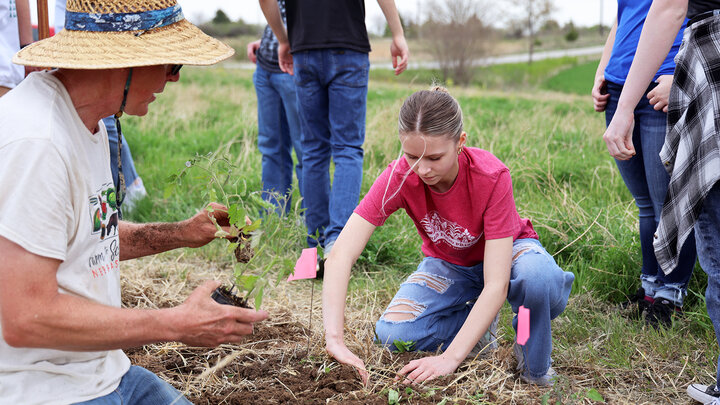The Nebraska Regional Food Systems Initiative (NERFSI) teams up with the Nebraska Department of Education to host the Farm to School Summit in Kearney, Oct. 17-18. The summit will unveil a statewide network designed to create and solidify relationships between schools, farmers and communities, and promote long-lasting farm-to-school initiatives.
A culmination of a two-year USDA grant aimed to increase the number of farm-to-school programs throughout the state, the summit brings together information from two years’ worth of listening sessions and input from Nebraska farmers, schools and community leaders about both the successes and challenges of farm-to-school programs.
“One of the things that we really want people to walk away with is an understanding that they’re not alone in doing this work,” said Ben Jewell, the Rural Prosperity Nebraska Extension educator and NERFSI team lead who helped organize the summit. “A lot of times, there are schools who’ve started a small farm-to-school project, and we really want them to feel like what they’re doing is worth it, that there’s support and resources out there for them.”
Many of those resources will be shared during sessions covering the gamut of farm-to-school topics, including the following:
- Making the first call: Connecting farmers to schools, and vice versa
- Finances: Creating bids and invoices
- Budgeting for farm-to-school
- Supply and demand: Growing food that’s needed
- Online Presence: MarketMaker and online profiles
- Beef and farm-to-school programs
- On-site programs: Growing food on campus
- Hydroponics and small-scale farms in the classroom
“We’re covering some basic ‘101: What is Farm to School?’ information,” said Jewell. “But we’re also moving past that into more nitty, gritty details of how to make this work at the school level.”
Farm-to-school programs focus not only on providing schools with locally-grown food, but also educating students about agriculture and nutrition. These programs benefit schools by offering fresh, healthy food options and support local farmers by creating a stable market for their products. However, one of the common challenges is simply where to begin.
“A lot of folks are really interested in farm to school but don’t really know where to start,” said Jewell. “We’ve developed a lot of tools and resources to get them the help they need and deliver it in a more streamlined way through this network.”
This network will be introduced at the summit. Part online platform and part person-to-person meetings, the network provides access to a variety of resources, including webinars, monthly or quarterly calls with different stakeholder groups, and opportunities for ongoing collaboration for when questions or concerns arise. These stakeholders will be set up “on the ground” across the state to engage with communities, answer questions, and address needs that arise.
One main reason for the summit is to provide an opportunity for everyone across the state to gather in person, which is a rare occurrence these days, said Jewell.
“Farm to school is happening in all corners of the state—it’s just that people aren’t using that terminology,” Jewell continued. “An FFA program doesn’t say they’re doing farm to school, but they’re doing ag education. Another school is raising and slaughtering chickens. In some cases, some schools have five to seven acres of production space that the kids use to learn about production. The array of different activities that are happening in schools is really incredible, and we wanted to learn from them. We wanted to draw them in and ask, ‘How are you doing this, and how can we help others do this?’ So the idea of a summit network came out of that.”
The Nebraska Farm to School Summit is open to farmers, schools, community leaders, and anyone interested in supporting local food systems.
To learn more, visit the Nebraska Department of Education website.




